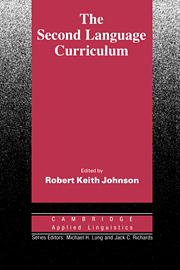Book contents
- Frontmatter
- Contents
- Contributors
- Series editors' preface
- Acknowledgements
- Overview
- I 1 CURRICULUM OVERVIEW
- I 2 CURRICULUM PLANNING
- II ENDS/MEANS SPECIFICATION
- Chapter 4 Needs assessment in language programming: from theory to practice
- Chapter 5 The role of needs analysis in adult ESL programme design
- Chapter 6 Service English programme design and opportunity cost
- III PROGRAMME IMPLEMENTATION
- IV CLASSROOM IMPLEMENTATION
- V EVALUATION
- Bibliography
- Index
Chapter 6 - Service English programme design and opportunity cost
Published online by Cambridge University Press: 05 October 2012
- Frontmatter
- Contents
- Contributors
- Series editors' preface
- Acknowledgements
- Overview
- I 1 CURRICULUM OVERVIEW
- I 2 CURRICULUM PLANNING
- II ENDS/MEANS SPECIFICATION
- Chapter 4 Needs assessment in language programming: from theory to practice
- Chapter 5 The role of needs analysis in adult ESL programme design
- Chapter 6 Service English programme design and opportunity cost
- III PROGRAMME IMPLEMENTATION
- IV CLASSROOM IMPLEMENTATION
- V EVALUATION
- Bibliography
- Index
Summary
Observations on programme design papers
This paper reflects upon the creation and maintenance of adequate service English provision in tertiary institutions where English is wholly or in part the medium of instruction and study. It thus discusses the classic English for Academic Purposes operation that has variously arisen in many parts of the world following the precipitate advance of English as the world's leading language of research, scholarship and advanced training, and following the changing patterns of non-native speaker enrolment in English-medium universities. However, if the subject matter of this paper is clear, an appropriate treatment of that subject matter remains somewhat obscure. As the ethnomethodologists would put it, there is some doubt as to what ‘counts as’ a paper on programme design. Even more difficult is the question of how we are to judge the value or usefulness of such a paper. Should we be after sense, sensibility or schematics? Should we be searching for Yeats's ‘paradigm that plays upon the spume of things’ or expecting reports from the ‘Hard Knocks’ school of life? Or somehow both?
One important reason why such questions are perplexing is that they expose to us the divided nature of the ESL world. The answers will very likely differ according to whether the respondents see themselves as working within an American or British ESL tradition. For instance, if we take TESOL Quarterly as the flagship of U.S. ESL thinking, then we will find therein a concentration of papers dealing with second language acquisition, classroom-centred research, the validation of tests and so on.
- Type
- Chapter
- Information
- The Second Language Curriculum , pp. 79 - 90Publisher: Cambridge University PressPrint publication year: 1989
- 5
- Cited by

